It’s Patti.... from Utah..... getting ready to return on Sunday....
WARNING: Long and potentially
boring post! Apologies in advance!
Since I
have been home and have had time to think a bit, I have had a lot of questions
regarding Scott’s loss of vision in his right eye. For instance, I understand the complete loss
of vision in the right eye due to permanent and irreparable damage to the right
Optic nerve. But.... why does he now
require the use of glasses for his left eye for the rest of his life. He did not require glasses prior to the
accident. If I cover one of my eyes
completely, I can still see just as clearly with the opposite eye. So.... did he also have some Optic Nerve
damage on the left eye? Is it instead
due to some impairment/damage to the second cranial nerve, the Optic nerve, on
the left.... and that will heal along with the rest of his brain injury? Was there some damage to the actual eye
itself?
I just
like to know why. And... I like to know
how function will be impacted and what we need to work on to restore as normal
function as possible. And..... if there is
something we can do to improve his current condition.
I missed
the first Opthalmology appt by being in Utah, but I will be in Phoenix for the
next one. In the meantime, I asked Ashley
to send me the link to an article she found on-line by NORA (Neuro-Optometric
Rehabilitation Association), titled “Implications of Acquired Monocular
Vision (loss of one eye)”.
I
thought I would share it with you, along with a summary of what it will mean to
Scott to now possess “Acquired Monocular Vision” ...the loss of vision in one
eye. Excerpts from the article are
posted below (in black), along with my comments (in red).
“Acquired monocular vision will
affect vision and the individual in several ways. There are two main issues
which are uniformly and predominantly addressed by the published literature and
authorities. The two primary deficits are loss of stereoscopic binocular vision
and reduction of peripheral field of vision. Most of the ramifications and
symptoms of monocular vision are a result of these two deficiencies.”
According to Borrish (reference
not cited),
1.
Monocular vision versus binocular vision results in
approximately a 25% decrease in the size of the field of view.
So…. obviously, he will need to compensate for loss of peripheral vision on the right side. His left eye can compensate quite a bit, as well as turning his head to improve his field of vision, but he will have to increase awareness of his loss of vision on his right and create strategies to see obstacles, return to driving, etc.
So…. obviously, he will need to compensate for loss of peripheral vision on the right side. His left eye can compensate quite a bit, as well as turning his head to improve his field of vision, but he will have to increase awareness of his loss of vision on his right and create strategies to see obstacles, return to driving, etc.
“Brady
writes the main problems in monocular vision are primarily attributable to a
loss of stereopsis and a reduction of the peripheral field of vision. According
to Brady, the loss of peripheral vision is between ten and twenty percent. He
says these problems will manifest as difficulties in eye hand coordination,
clumsiness, bumping into objects and/or people, ascending or descending stairs
or curbs, crossing the street, driving, various sports and miscellaneous
activities of daily living which require stereopsis ( see #2) and peripheral
vision.”
2.
Monocularity causes an absence of stereopsis which comes from
the lack of comparison of retinal disparity present in binocular individuals.
His depth perception will be impaired. Depth Perception is created when the brain compares the slightly different vision between the left and the right eyes.
His depth perception will be impaired. Depth Perception is created when the brain compares the slightly different vision between the left and the right eyes.
“Schein writes,
"Individuals limited by loss of vision in one eye have difficulties in
depth perception." "Determining the distance within three feet from
the eye is extremely difficult and highly unreliable." "Beyond three
feet, other distance cues can substitute for loss of binocular disparity,
provided monocularly impaired individuals are free to move their heads, which
allows them to obtain information about relative distances by taking more time
than they would when visual images from both eyes can be superimposed, as they
are with binocular vision." "Mishaps can occur when monocularly
impaired persons are in heavy traffic unless the head is constantly moving from
side to side to increase the visual field".
Regarding driving safety,
Schein quotes a study by Keeney, et al. who state that, "nationwide,
monocularly impaired individuals have seven times more accidents than the
general population with which they were compared." Schein states,
"Occupations most affected are those that require close work (e.g. barber,
beautician, bartender, machinist, needle worker, surgeon); those that involve
vehicle operation (e.g. airline pilot, bus driver, motorman); and any work
demanding prolonged visual vigilance (e.g. air traffic controller)."
This raises some questions as to what Scott's occupational future might hold, and what specialties remain realistic for him. We will continue to hope for the best for his dreams to become a Physician, and for him to chose his specialty.
This raises some questions as to what Scott's occupational future might hold, and what specialties remain realistic for him. We will continue to hope for the best for his dreams to become a Physician, and for him to chose his specialty.
3.
Monocular individuals will have decreased visual acuity
(compared to their binocular counterparts) because of their lack of binocular
summation. Binocular summation is the
phenomenon by which people see better with both eyes together than by either
eye alone.
This is likely the answer to my question above concerning why Scott will need glasses for his left eye forever. Gotta’ love simple answers!
This is likely the answer to my question above concerning why Scott will need glasses for his left eye forever. Gotta’ love simple answers!
4.
Monocular people will have an impairment in their orientation
(to space) which results from a lack of kinesthetic cues arising from
convergence (binocular "eye aiming") and accommodation (focusing).
So... for balance and coordination, our brain takes in information from our eyes, from our vestibular system in our inner ears, and from our joint and tendon receptors. His body will need to retrain the other systems to compensate, and will need to train his eyes to interpret the information in a different way. In my experience, when there is a disparity in the incoming information to the brain from one of these three systems, then dizziness or vertigo can also occur. This can also be re-trained, but it is disconcerting initially. So far, Scott has not complained of any dizziness or vertigo.
So... for balance and coordination, our brain takes in information from our eyes, from our vestibular system in our inner ears, and from our joint and tendon receptors. His body will need to retrain the other systems to compensate, and will need to train his eyes to interpret the information in a different way. In my experience, when there is a disparity in the incoming information to the brain from one of these three systems, then dizziness or vertigo can also occur. This can also be re-trained, but it is disconcerting initially. So far, Scott has not complained of any dizziness or vertigo.
“Gunter
von Noorden writes that the monocular cues of motion parallax, linear
perspective, overlay of contours, distribution of highlights and shadows, size
of known objects and aerial perspective can be used for spatial orientation. He
states, "The nature of non stereoscopic clues is that they are
experiential and can be meaningful only when they are capable of being related
to past experience."
This is simply stating that there are teachable strategies to help counteract for the loss of steropsis and spatial orientation.
This is simply stating that there are teachable strategies to help counteract for the loss of steropsis and spatial orientation.
5.
Contrast sensitivity in the remaining eye may be enhanced
following monocular vision loss to "supernormal performance".
Monocular individuals can be expected to demonstrate more head movements as a
way of enhancing depth perception for eye-hand coordination tasks. Our bodies
have amazing ways to compensate!
Scott might experience limited or decreased:
o
Peripheral Vision
o
Depth Perception
o
Visual acuity with his left eye
o
Orientation to space
o
Visual Motor Skills (Eye-Hand Coordination)
o
Balance
o
Coordination / Increased clumsiness
o
Manipulation of things with his hands
o
Reaching
“Brady raises additional concerns and issues for monocular
individuals. One, the need for eye protection and safeguarding the good eye.
Two, the need to have back-up prescriptions on hand. Three, the need to employ
driving aids and techniques such as special mirrors, scanning with the head and
eyes, and heightened awareness. Four, the implications of cosmesis. And five,
the concerns for a prosthetic device.”
We certainly have a heightened concern for protecting his left eye. In the last few days, his left eyelid is now starting to fully close, but initially, it did not close completely. We were concerned about that eye drying out or being damaged in some way due to the loss of protection afforded by closing his eyelid when he sleeps. Ashley asked the Opthalmologist for some “gunk” to put in his eye to protect it just incase there was any drying out of that eye. Plus, we manually closed it for him, when he slept. We are grateful that he is now able to close it on his own. This reduces our worry.
Scott is fortunate that there are no real outward physical signs of the blindness. You would have to know that he is blind. You wouldn’t suspect it by looking at him or by watching his eye movements. His right eye follows visual stimuli and sounds. The cranial nerves that control movements of his right eye are still intact. They are simply following the information given to the brain by the left eye, but they work.
And…. he does not need a prosthetic device. The eyeball itself is fine; it is the optic nerve innervating the eyeball that is damaged.
We certainly have a heightened concern for protecting his left eye. In the last few days, his left eyelid is now starting to fully close, but initially, it did not close completely. We were concerned about that eye drying out or being damaged in some way due to the loss of protection afforded by closing his eyelid when he sleeps. Ashley asked the Opthalmologist for some “gunk” to put in his eye to protect it just incase there was any drying out of that eye. Plus, we manually closed it for him, when he slept. We are grateful that he is now able to close it on his own. This reduces our worry.
Scott is fortunate that there are no real outward physical signs of the blindness. You would have to know that he is blind. You wouldn’t suspect it by looking at him or by watching his eye movements. His right eye follows visual stimuli and sounds. The cranial nerves that control movements of his right eye are still intact. They are simply following the information given to the brain by the left eye, but they work.
And…. he does not need a prosthetic device. The eyeball itself is fine; it is the optic nerve innervating the eyeball that is damaged.
“According to Linberg, "Recovery after loss of one eye
requires an adjustment to monocular vision and resolution of a significant,
serious emotional trauma." Linberg, Tillman and Allara surveyed 125
monocular patients by questionnaire regarding their recovery following the loss
of vision of one eye. Their results showed: 85 of the 125 respondents reported
that the loss had not changed their life in any permanent way; 7 reported
persistent visual problems; 12 reported problems in employment; and 21 reported
anxiety or poor self-image. Among 49 with sudden loss (such as
Scott’s injury), 50% reported a less than one month adjustment period for driving,
work, recreation, home activities, or walking. Ninety three percent of the
people questioned reported their adjustment was completed by 1 year. The
authors concluded, "most patients were able to resume everyday activities
after a short period of adjustment. Problems with employment and self-image were
frequent, but visual problems were unusual."
This is clearly encouraging that training and increased awareness
will likely result in a decent return to function. Regarding the “significant, serious emotional
trauma” … The loss of vision is only one aspect of Scott’s “significant and
serious” traumas, but likely the most impactful long term. We are encouraged and hopeful that most, if
not all, of his cognitive skills will return.
We won’t know for a year, likely, but… we are encouraged by his rapid
rate of progress. (Seriously, I have
seen a LOT of rehab over the past 30 years as a physical therapist, and I am
stunned by his rate of recovery! It is
soooo amazing to see the benefit and tangible evidence of daily prayers, youth,
and good health! Keep those prayers
coming!!! He still has a ways to go, and
they are working! We are so grateful for
all of the prayers said on his behalf!
Talking about Top of Mind Awareness!
We love that Heavenly Father can’t go a full day without being reminded
of Scott’s situation and needs! Thank you so very much!)
A number of people have asked how Scott is dealing emotionally with
the blindness. So far, he has been pretty matter of fact about it. He uses words/phrases such as “Dang it”, “That’s
unfortunate”, “That’s not good”….. when discussing his loss of vision. Originally, he was EXTREMELY uncomfortable
with having his left eye covered for testing, and basically wouldn’t allow it,
but now he has adjusted and become less apprehensive about it. He hasn’t really shown any emotional distress
or break down of any kind yet. Initially,
I wondered if he simply wasn’t capable of expressing his emotions very well due
to the head injury or …if he simply didn’t fully comprehend the significance of
the injury….. but now it is clear that he has full comprehension of his injury
and it’s significance,…. and he is currently
capable of expressing his emotions…. And we still haven’t seen much of an
emotional reaction. I can only imagine
that he isn’t thrilled by the situation.
And… I have to wonder if he will struggle more with his emotions
about it later down the road. Right now,
he has sooo many injuries to focus on healing and so much function to regain…. that rehab is his primary focus and dominates
so much time during his day. He doesn’t
really have time to commiserate on his specific losses. He will have more time later down the road to
be alone with his many thoughts about the accident and any permanent
losses. He may struggle more with things
at this time.
Then again…. Scott is not one to “waste his time” on tasks or feelings that don’t serve him well. He has experienced many difficult situations in his life and has taken them at face value…. Said to himself, “Okay, this is what I am dealt with. Now it’s time to figure out a plan of action. Then he goes to work on implementing his plan.”
Plus, Scott’s faith really enters into the picture here. Scott is very strong in his faith, and has shared with us that he knows that heavenly Father gave him this experience because he needed to grow in a way that he wouldn’t have otherwise. Scott strongly believes this situation is divinely designed to provide himself with the necessary growth that he will require for some purpose that Heavenly Father has for him later down the road. I love the comfort that brings to him and to us. I am also very selfishly grateful that Heavenly Father still has a plan for him here on earth and that he wasn’t ready to call him back Home!
Then again…. Scott is not one to “waste his time” on tasks or feelings that don’t serve him well. He has experienced many difficult situations in his life and has taken them at face value…. Said to himself, “Okay, this is what I am dealt with. Now it’s time to figure out a plan of action. Then he goes to work on implementing his plan.”
Plus, Scott’s faith really enters into the picture here. Scott is very strong in his faith, and has shared with us that he knows that heavenly Father gave him this experience because he needed to grow in a way that he wouldn’t have otherwise. Scott strongly believes this situation is divinely designed to provide himself with the necessary growth that he will require for some purpose that Heavenly Father has for him later down the road. I love the comfort that brings to him and to us. I am also very selfishly grateful that Heavenly Father still has a plan for him here on earth and that he wasn’t ready to call him back Home!
Hopefully, this has answered some of the questions you have had concerning Scott and the loss of vision he has in his right eye….. for those who stuck with me for this long, long post!
Love to all!
Patti
Oh... "Then and now" eye pics....
What a difference a month has made!
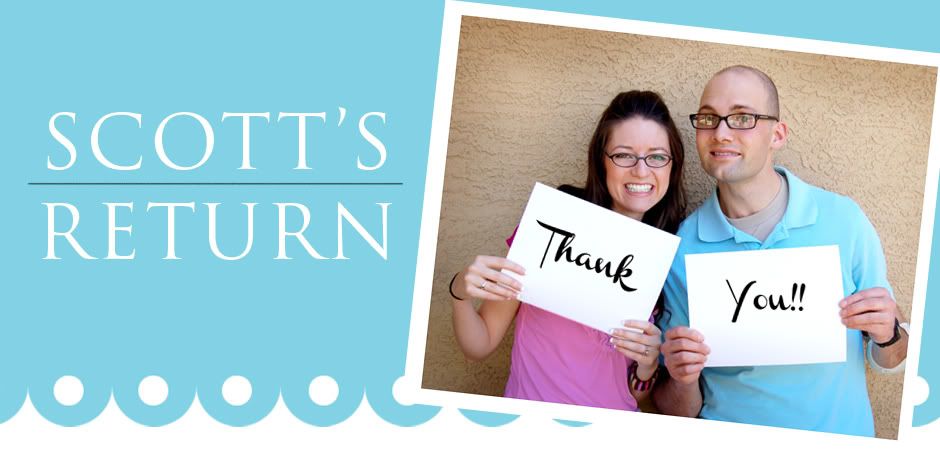
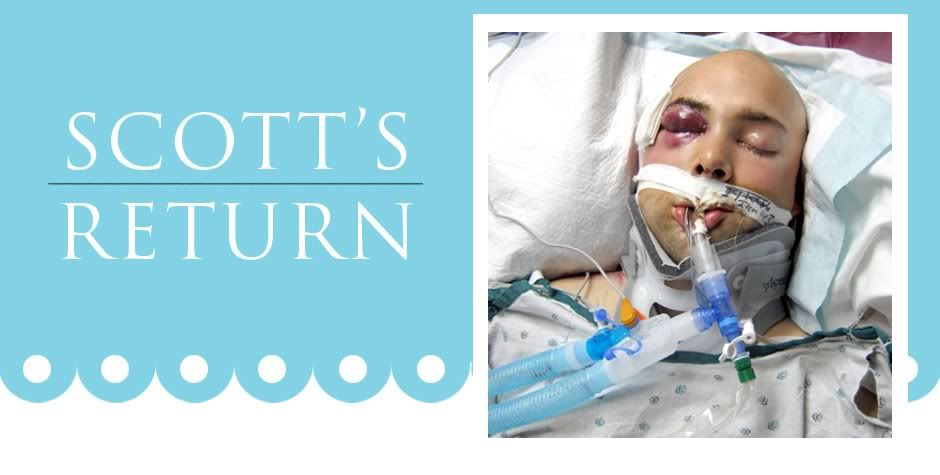
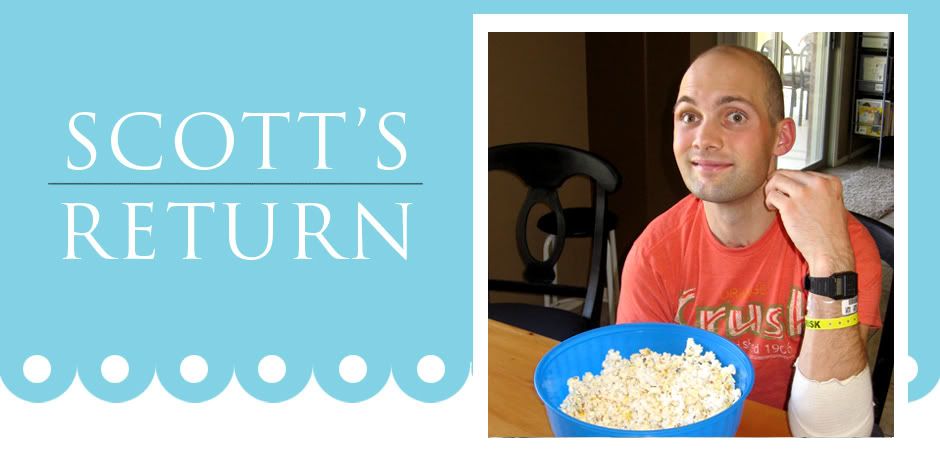
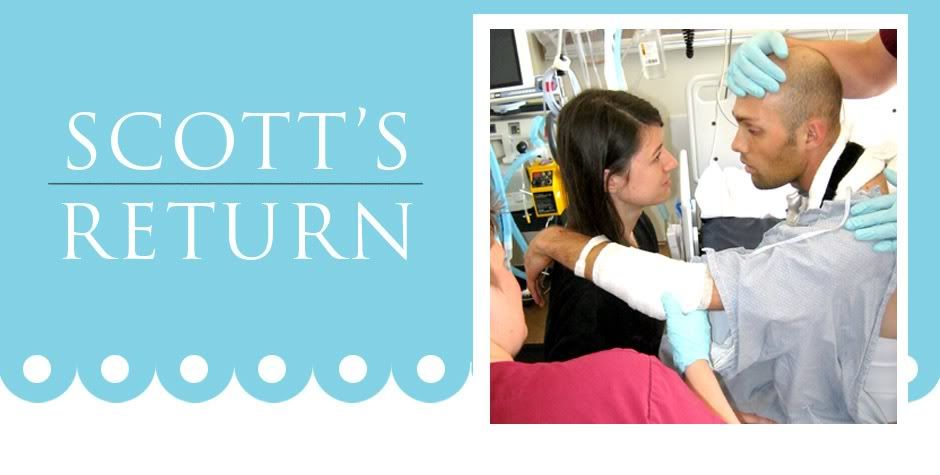
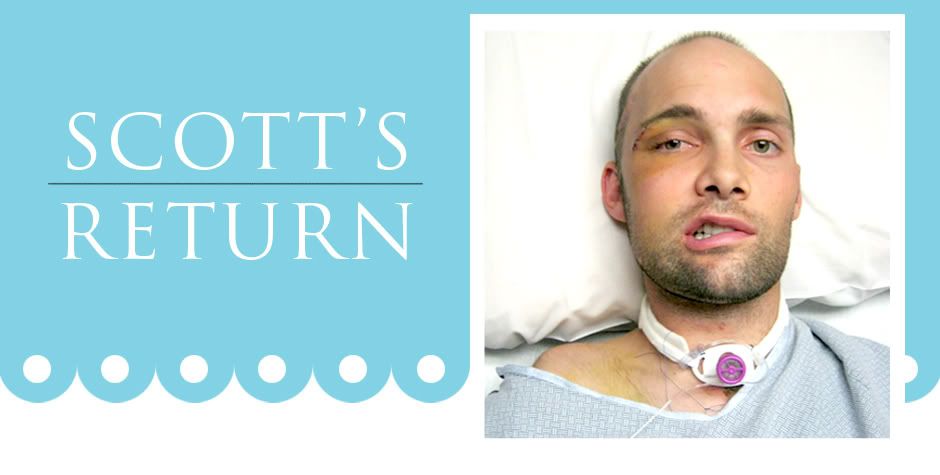


Thanks Patti for the fantastic detail and I know Scott is so excited to see you on Sunday.
ReplyDeleteI just want to take a moment to communicate to those supporters of Scott who may not adhere to the concepts of divine intervention and faith. Regardless of your beliefs, it is Scott's spirituality that is "winning the day" and we are all blessed.